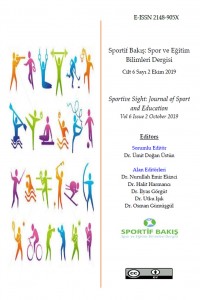Öz
This study aimed at searching the effect of the coach-athlete relationship on the athletes' level of aggression. As the sample of the study, 420 athletes voluntarily participated in the survey. Two hundred forty-three of the participants were taekwondo athletes (107 female & 136 male), 177 were protected football player. In the study to obtain data in addition to demographic information form, the "Coach-Athlete Relationship Inventory Athlete Form" and "Multi-Dimensional Aggression Scale" were used. The collected data were analyzed by SPSS 20 package program. The multi-regression analysis used to determine the correlation between the coach-athlete relationship and the aggression level of the participants. According to analyze results, there was a negative and moderate correlation between the level of the coach-athlete relationship and the aggression, however; there was a positive and moderate correlation between the calmness level of the athletes. Therefore, we can say that if the coach-athlete relationship increases, the aggression level decreases. Moreover, the coach-athlete relationship is determined to be a meaningful indicator of athletes' aggression levels.
Anahtar Kelimeler
Kaynakça
- Altıntaş, A., Kazak, Ç. Z., & Aşçı, H. (2012). Antrenör-sporcu ilişkisinin değerlendirilmesi: Geçerlik ve güvenirlik çalışması. Spor Bilimleri Dergisi Hacettepe Journal of Sport Sciences, 23 (3), 119–128.
- Balkaya, F., & Şahin, N. H. (2003). Çok boyutlu öfke ölçeği. Türk Psikiyatri Dergisi, 14(3), 192-202.
- Erdem, K. (2005). Futbolda kenar yönetimi yönetsel beceriler strateji taktik. İstanbul: Morpa Kültür Yayınları, 14.
- Erdoğan, N., Zekioğlu, A., & Dorak, F. (2014). Hentbol antrenörlerine göre, sporcuların performansını psikolojik yönden etkileyen faktörler nelerdir? Nitel çalışma. International Journal of Science Culture and Sport, 1, 194-207.
- Flores, D. (2013). The coach-athlete relationship: A crossfit perspective (Degree of Master of Science). George Mason University.
- İkizler, C., & Karagözoğlu, C. (1997). Sporda başarının psikolojisi. (3. Baskı). İstanbul: Alfa Basım Yayım Dağıtım.
- Jowett, S., & Cockerill, I. (2002). Incompatibility in the coach–athlete relationship. In: Cockerill I., ed. Solutions in Sport Psychology, 16-31.
- Jowett, S., & Cockerill, I. M. (2003). Olympic medallists’ perspective of the althlete–coach relationship. Psychology of Sport and Exercise, 4(4), 313-331.
- Jowett, S., & Ntoumanis, N. (2004). The coach–athlete relationship questionnaire (CART‐Q): Development and initial validation. Scandinavian Journal of Medicine & Science in Sports, 14(4), 245-257.
Öz
This study aimed at searching the effect of the coach-athlete relationship on the athletes' level of aggression. As the sample of the study, 420 athletes voluntarily participated in the survey. Two hundred forty-three of the participants were taekwondo athletes (107 female & 136 male), 177 were protected football player. In the study to obtain data in addition to demographic information form, the "Coach-Athlete Relationship Inventory Athlete Form" and "Multi-Dimensional Aggression Scale" were used. The collected data were analyzed by SPSS 20 package program. The multi-regression analysis used to determine the correlation between the coach-athlete relationship and the aggression level of the participants. According to analyze results, there was a negative and moderate correlation between the level of the coach-athlete relationship and the aggression, however; there was a positive and moderate correlation between the calmness level of the athletes. Therefore, we can say that if the coach-athlete relationship increases, the aggression level decreases. Moreover, the coach-athlete relationship is determined to be a meaningful indicator of athletes' aggression levels.
Anahtar Kelimeler
Kaynakça
- Altıntaş, A., Kazak, Ç. Z., & Aşçı, H. (2012). Antrenör-sporcu ilişkisinin değerlendirilmesi: Geçerlik ve güvenirlik çalışması. Spor Bilimleri Dergisi Hacettepe Journal of Sport Sciences, 23 (3), 119–128.
- Balkaya, F., & Şahin, N. H. (2003). Çok boyutlu öfke ölçeği. Türk Psikiyatri Dergisi, 14(3), 192-202.
- Erdem, K. (2005). Futbolda kenar yönetimi yönetsel beceriler strateji taktik. İstanbul: Morpa Kültür Yayınları, 14.
- Erdoğan, N., Zekioğlu, A., & Dorak, F. (2014). Hentbol antrenörlerine göre, sporcuların performansını psikolojik yönden etkileyen faktörler nelerdir? Nitel çalışma. International Journal of Science Culture and Sport, 1, 194-207.
- Flores, D. (2013). The coach-athlete relationship: A crossfit perspective (Degree of Master of Science). George Mason University.
- İkizler, C., & Karagözoğlu, C. (1997). Sporda başarının psikolojisi. (3. Baskı). İstanbul: Alfa Basım Yayım Dağıtım.
- Jowett, S., & Cockerill, I. (2002). Incompatibility in the coach–athlete relationship. In: Cockerill I., ed. Solutions in Sport Psychology, 16-31.
- Jowett, S., & Cockerill, I. M. (2003). Olympic medallists’ perspective of the althlete–coach relationship. Psychology of Sport and Exercise, 4(4), 313-331.
- Jowett, S., & Ntoumanis, N. (2004). The coach–athlete relationship questionnaire (CART‐Q): Development and initial validation. Scandinavian Journal of Medicine & Science in Sports, 14(4), 245-257.
Ayrıntılar
| Birincil Dil | İngilizce |
|---|---|
| Konular | Spor Hekimliği |
| Bölüm | Sporda Psiko-Sosyal Alanlar |
| Yazarlar | |
| Yayımlanma Tarihi | 10 Ekim 2019 |
| Yayımlandığı Sayı | Yıl 2019 Cilt: 6 Sayı: 2 |


